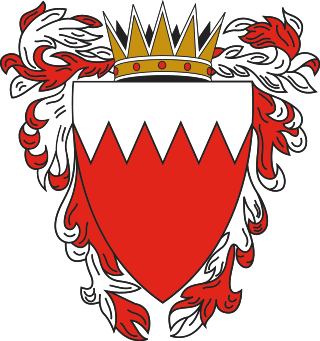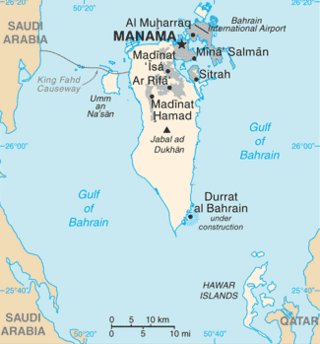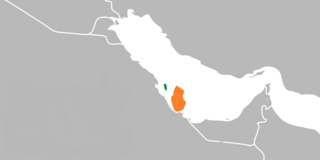Related Research Articles

Politics of Bahrain has since 2002 taken place in a framework of a constitutional monarchy where the government is appointed by the King of Bahrain, King Hamad bin Isa Al Khalifa. The head of the government since 2020 is Crown Prince Salman bin Hamad Al Khalifa, who became Prime Minister following the death of Khalifa bin Salman Al Khalifa, and who also serves as Deputy Commander of the Bahrain Defence Force. The parliament is a bicameral legislature, with the Council of Representatives elected by universal suffrage, and the Consultative Council appointed directly by the king.

Lashkar-e-Taiba is a Pakistani Islamist Salafi jihadist organisation. Described as one of Pakistan's "most powerful jihadi groups", it is most infamous outside Pakistan. The organisation's primary stated objective is to merge the whole of Kashmir with Pakistan. It was founded in 1985–1986 by Hafiz Saeed, Zafar Iqbal Shehbaz, Abdullah Azzam and several other Islamist mujahideen with funding from Osama bin Laden during the Soviet–Afghan War. It has been designated a terrorist group by numerous countries.

The Bahrain Centre for Human Rights was a Bahraini non-profit non-governmental organisation which works to promote human rights in Bahrain, which was founded by a number of Bahraini activists in June 2002. The centre was given a dissolution order after its former president Abdulhadi Al Khawaja was arrested in September 2004 a day after criticizing the country's Prime Minister, Khalifah ibn Sulman Al Khalifah at a seminar in which he blamed the Prime Minister for the failure of widespread economic development for all citizens. The BCHR is still banned by the government, but has remained very active.
Torture in Bahrain refers to the violation of Bahrain's obligations as a state party to the United Nations Convention against Torture and Other Cruel, Inhuman or Degrading Treatment or Punishment and other international treaties and disregard for the prohibition of torture enshrined in Bahraini law.
Following Bahrain's independence from the British in 1971, the government of Bahrain embarked on an extended period of political suppression under a 1974 State Security Law shortly after the adoption of the country's first formal Constitution in 1973. Overwhelming objections to state authority resulted in the forced dissolution of the National Assembly by Amir Isa bin Salman Al Khalifa and the suspension of the Constitution until 2001. The State Security Law of 1974 was a law used by the government of Bahrain to crush political unrest from 1974 until 2001. It was during this period that the worst human rights violations and torture were said to have taken place. The State Security Law contained measures permitting the government to arrest and imprison individuals without trial for a period of up to three years for crimes relating to state security. A subsequent Decree to the 1974 Act invoked the establishment of State Security Courts, adding to the conditions conducive to the practice of arbitrary arrest and torture. The deteriorating human rights situation in Bahrain is reported to have reached its height in the mid-1990s when thousands of men, women and children were illegally detained, reports of torture and ill-treatment of detainees were documented, and trials fell short of international standards.

The 1990s uprising in Bahrain also known as the uprising of dignity was an uprising in Bahrain between 1994 and 1999 in which leftists, liberals and Islamists joined forces to demand democratic reforms. The uprising caused approximately forty deaths and ended after Hamad bin Isa Al Khalifa became the Emir of Bahrain in 1999 and a referendum on 14–15 February 2001 massively supported the National Action Charter. The uprising resulted in the deaths of around 40 civilians and at least one Bahraini soldier.

Bahrain's record on human rights has been described by Human Rights Watch as "dismal", and having "deteriorated sharply in the latter half of 2010". Their subsequent report in 2020 noted that the human rights situation in the country had not improved.

Sheikh Abdul Amir al-Jamri was one of the most prominent Shia clerics and opposition leaders in Bahrain. He was also a writer and a poet.

General elections were held in Bahrain in October 2010 to elect the forty members of the Council of Representatives. The first round of voting was held on 23 October, with a second round on 30 October. Amidst boycotts and arrests, Al Wefaq won 18 of the 40 seats. Four women were elected.

The July 2010 Lahore bombings occurred on 1 July 2010 in Lahore, Punjab, Pakistan. Two suicide bombers blew themselves up at the Sufi shrine, Data Darbar Complex. At least 50 people were killed and 200 others were hurt in the blasts. It was the biggest attack on a Sufi shrine in Pakistan since 2001.
The Manama incident on August 26, 2010 involved the arrest in the Seef shopping mall in Manama, Bahrain, of Fakhria al-Singace, the sister of Dr Abdul Jalil Al-Singace, human-rights spokesperson for the Bahrain opposition Haq Movement. According to The New York Times, three women wearing the niqāb and abaya entered the mall and unfurled a banner reading, "It is forbidden to arbitrarily arrest and detain people". More than a dozen plainclothes and uniformed police officers surrounded them, and Fakhria al-Singace was handcuffed and arrested after being pinned spread-eagled to a cafe table. She was released the next day.

The 2011Bahraini uprising was a series of anti-government protests in Bahrain led by the mainly Shia and some Sunni Bahraini opposition from 2011 until 2014. The protests were inspired by the unrest of the 2011 Arab Spring and protests in Tunisia and Egypt and escalated to daily clashes after the Bahraini government repressed the revolt with the support of the Gulf Cooperation Council and Peninsula Shield Force. The Bahraini protests were a series of demonstrations, amounting to a sustained campaign of non-violent civil disobedience and some violent resistance in the Persian Gulf country of Bahrain. As part of the revolutionary wave of protests in the Middle East and North Africa following the self-immolation of Mohamed Bouazizi in Tunisia, the Bahraini protests were initially aimed at achieving greater political freedom and equality for the 45% Shia population.
The international reactions to the 2011 Bahraini uprising include responses by supranational organisations, non-governmental organisations, media organisations, and both the governments and civil populaces, like of fellow sovereign states to the protests and uprising in Bahrain during the Arab Spring. The small island nation's territorial position in the Persian Gulf not only makes it a key contending regional power but also determines its geostrategic position as a buffer between the Arab World and Iran. Hence, the geostrategic implications aid in explaining international responses to the uprising in Bahrain. Accordingly, as a proxy state between Saudi Arabia and Iran, Bahrain's domestic politics is both wittingly and unavoidably shaped by regional forces and variables that determine the country's response to internal and external pressures.

The Day of Rage is the name given by protesters in Bahrain to 14 February 2011, the first day of the national uprising as part of the Arab Spring. Inspired by successful uprisings in Egypt and in Tunisia, Bahraini youth organised protests using social-media websites. They appealed to the Bahraini people "to take to the streets on Monday 14 February in a peaceful and orderly manner". The day had a symbolic value, being the ninth and tenth anniversaries of the country's 2002 constitution and the National Action Charter respectively.
Bahrain Tamarod, also known as August 14 Rebellion, was a three-day protest campaign in Bahrain that began on 14 August 2013, the forty-second anniversary of Bahrain Independence Day and the two-and-a-half-year anniversary of the Bahraini uprising. The call for protests had started in early July following and inspired by the Egyptian Tamarod Movement that led to the removal of President Mohamed Morsi. Calling for a "free and democratic Bahrain", Tamarod activists, who mobilized social networking websites, said their movement was peaceful, national and non-sectarian. They called for gradual peaceful civil disobedience starting from 14 August. The movement gained the support of opposition societies and human rights activists, including those languishing in prison. The government however, repeatedly warned against the protests, promising those who participate with legal action and forceful confrontation. Rights activists and media reported that authorities had stepped up their crackdown campaigns in the weeks leading to the protests.

Bilateral relations exist between the State of Qatar and the Kingdom of Bahrain. They first began in 1971.

The Saudi–led intervention in Bahrain began on 14 March 2011 to assist the Bahraini government in suppressing an anti-government uprising in the country. The intervention came three weeks after the U.S. pressured Bahrain to withdraw its military forces from the streets. As a decision by Gulf Cooperation Council (GCC), the intervention included sending 1,000 (1,200) troops with vehicles from Saudi Arabia at the invitation of the Al-Khalifa ruling family, marking the first time the GCC used such a collective military option for suppressing a revolt.

Bilateral relations exist between the countries of Bahrain and Iran. Since the 1979 Iranian Revolution, relations between the two countries have been strained over various geopolitical issues such as the interpretations of Islam, Awakening of the Islamic world, and relations with the United States, Europe, and other Western countries. In addition, Iran has been severely critical of Bahrain for hosting the United States Fifth Fleet within the Persian Gulf at the Naval Support Activity Bahrain base.
The insurgency in Bahrain is an ongoing insurgency by militant groups, part of the Bahraini Opposition, supported by Iran, to topple the government of Bahrain.

The al-Mukhtar Brigades, also called Saraya al-Makhtar or Bahraini Islamic Resistance, is a Bahraini Shia insurgent movement that has taken part in several attacks against government targets. It is classified as a terrorist organization by multiple countries, including the United States and United Kingdom. The United States and Bahrain have both accused the Islamic Revolutionary Guard Corps (IRGC) of backing the organization. It is one of the main opposition movements in Bahrain to take up arms and is one of the rebel factions of the insurgency in Bahrain, the main other being the al-Ashtar Brigades.
References
- 1 2 3 Hussain, Thomas (14 March 1996). "Bahraini restaurant attacked, 7 killed". United Press International. Archived from the original on 11 January 2025.
- 1 2 Rubin, Barry; Rubin, Judith Colp (2015). Chronologies of Modern Terrorism. Routledge. p. 211. ISBN 9781317474654.
- ↑ Hussain, Thomas (16 March 1996). "Bahrain arrests 7 in restaurant arson". United Press International. Archived from the original on 11 January 2025.
- ↑ Hussain, Thomas (7 April 1996). "Bahrain Sheraton targeted by arsonists". United Press International. Archived from the original on 11 January 2025.
- ↑ "Routine Abuse, Routine Denial: Civil Rights and the Political Crisis in Bahrain". Human Rights Watch. 1 January 2006. Archived from the original on 11 January 2025.
- ↑ "Iraq Report: April 26, 2002". Radio Free Europe/Radio Liberty. Vol. 5, no. 11. 26 April 2002. Archived from the original on 11 January 2025.